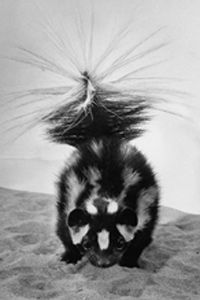Quck answer
Contrary to popular belief, bathing in tomato juice is not the most effective way to get rid of skunk spray. A mixture of hydrogen peroxide, baking soda, and dish soap is a more effective solution. It’s important to avoid getting the spray in your eyes and to immediately wash any clothes or items that have come into contact with the spray. Additionally, it’s best to leave any clothing or items outside until they have been thoroughly washed to avoid spreading the smell.
Wild Animals

This picture displays a skunk, an animal known for its ability to spray a noxious liquid when threatened.
Many animals have developed methods of self-defense, such as porcupines with their quills or turtles with their shells. However, skunks have perfected their tactics, using their scent to ward off predators. When threatened, skunks turn around and spray a smelly liquid from glands near their rectum. The spray can be accurately released in a fanlike pattern, reaching a distance of up to 15 feet. Even the bravest animals avoid skunks due to the nauseating odor.
Despite the stench, skunks play an important role in the ecosystem. They are omnivores, feeding on insects, small rodents, fruits, and acorns. Their diet helps to control the rodent population and keep roadways clean. Skunks also make their homes in abandoned burrows or hollow logs, as well as urban areas beneath buildings and woodpiles.
If a skunk is present in your home, you should not fear their scent. They rarely attack unless provoked and give warning before spraying. However, if you do encounter skunk spray, tomato juice is not the most effective solution. Instead, a mixture of hydrogen peroxide, baking soda, and dish soap can neutralize the odor. Skunks may have a potent defense mechanism, but they also play an important role in the ecosystem.
FAQ
1. What do skunks do when they feel threatened?
When a skunk feels threatened, it will spray a liquid from its anal glands. This liquid contains chemicals called thiols which produce a strong odor that can last for days.
2. What should I do if a skunk sprays me?
If a skunk sprays you, the first thing you should do is try to get away from the skunk. Then, remove any contaminated clothing and flush your eyes with water. Wash the affected area with soap and water, and avoid rubbing your eyes or any other areas that may have come into contact with the spray.
3. Does tomato juice really work to get rid of skunk odor?
Tomato juice is often recommended as a remedy for skunk odor, but it is not very effective. The acid in the tomato juice may help to break down some of the chemicals in the skunk spray, but it does not fully eliminate the odor.
4. What other remedies can I try to get rid of skunk odor?
Other remedies that may help to get rid of skunk odor include using a mixture of hydrogen peroxide, baking soda, and dish soap. This mixture can be applied to the affected area and left on for several minutes before rinsing off with water.
5. Can skunk spray cause any health problems?
Skunk spray is not toxic, but it can cause respiratory problems if inhaled. It can also cause irritation to the eyes and skin.
6. How can I prevent skunks from spraying me?
To prevent skunks from spraying you, avoid approaching or cornering them. If you encounter a skunk, try to give it plenty of space to escape. You can also use repellents or fencing to keep skunks away from your property.
7. Are skunks dangerous?
Skunks are generally not dangerous to humans, but they can carry diseases such as rabies. It is important to avoid contact with skunks and to seek medical attention if you are bitten or scratched by one.
8. What should I do if I see a skunk in my yard?
If you see a skunk in your yard, do not approach it. Try to give it plenty of space to escape. You can also use repellents or fencing to keep skunks away from your property.
9. What do skunks eat?
Skunks are omnivores and eat a variety of foods including insects, small mammals, fruits, and vegetables.
10. Where do skunks live?
Skunks are found throughout North and South America and can live in a variety of habitats including forests, grasslands, and suburban areas.
11. Can skunks climb trees?
Skunks are not known for their climbing abilities, but they can climb trees if necessary to escape danger or to reach food.





Leave a Reply